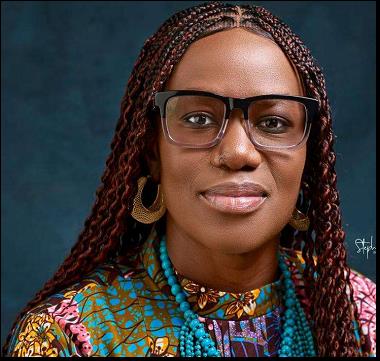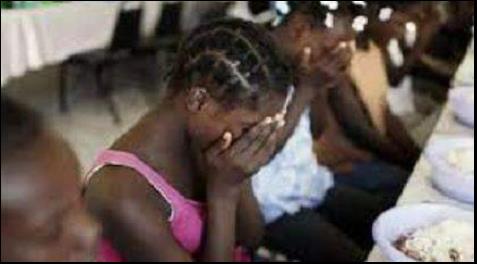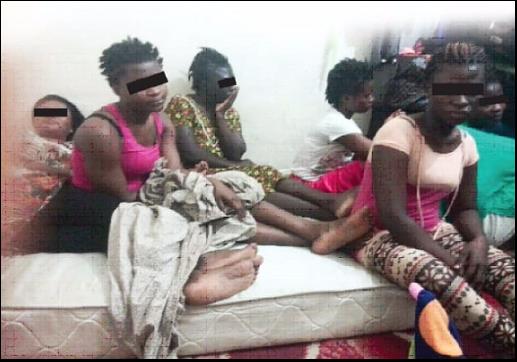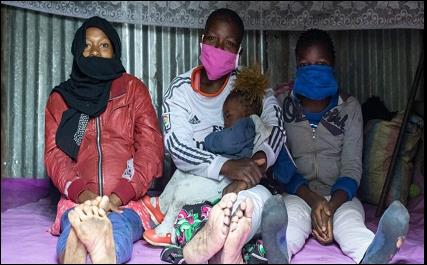
By PALANG KASMI
IN recent times, Plateau State has been in the news and social media for the wrong reasons as children from the state have been found to have been trafficked from the state to other parts of the country and even foreign countries.
In a recent trending online video, over 10 teenage Nigerian girls between the ages of 15 and 16 were rescued by authorities after they were trafficked to Ghana for prostitution. Among them were girls from Plateau State. This is just one out of the many arrests this year where Plateau girls were found in the list of girls trafficked for sexual exploitation and domestic work across the country.

Statistics from the International Labour Organisation (ILO) estimates that fifteen 15 million children are engaged in child labour in Nigeria with 40% of them at the risk of being trafficked both internally and externally for various purposes. They are engaged in domestic labour, prostitution, pornography, armed conflict, farm work and even rituals.
Due to this disturbing trend, Coordinator of Child Protection Network (CPN) in Plateau State, Mrs. Sandra Chikan, has recently in a press statement, condemned the current trend of trafficking children from the state.

Chikan, in the statement made available to newsmen in Jos, stressed that CPN would no longer condone the illicit acts where children and young girls from Plateau State are tricked, forced or persuaded to leave their homes and then transported and forced to work or sold and trafficked for sexual exploitation.
According to her, because of the alarming increase in cases of child trafficking, young girls from Plateau State have on several occasions been lured by syndicates to other countries and states for prostitution and child labour.
“This ugly trend must stop; we have to rise up against it; we will no longer condone this situation, CPN condemns this dastardly act, and we call on parents and guardians to be aware of these criminals,” she declared.
Describing the situation as disturbing, Chikan called for stiffer punishment for perpetrators to serve as a deterrent to others adding: “Parents and community members should not fail in their primary responsibility of protecting and training their children. Government should explore options for implementing policies and engaging stakeholders in a concerted effort to combat this menace and criminality.” She also called on community leaders to report unlawful activities and crimes to law enforcement agencies.

Being one of the northern states battling with security challenges in the country, many communities in Plateau State have been affected by unprovoked attacks and killings, resulting in the displacement of many residents from their ancestral homes in Mangu, Bokkos, Riyom, Barkin Ladi and Riyom local government areas of the state.
While some of the displaced residents have run to seek refuge with their families or relatives, others are forced to live in Internally Displaced Persons (IDP) camps as temporary shelters. Over 500 persons are reported to be IDPs in Plateau State.
At such challenging times, among some of the social ills that affects people living in the IDP camps is Trafficking In Persons (TIP). The human traffickers usually cash in on the humanitarian crisis and pretend to come with solutions. Sadly, they have ulterior motives which usually result to dire consequences, many experts have warned.
Traffickers have a pattern of pretending to render help to unsuspecting victims. They come and pick out of school kids with promises to enroll them into school, or pick girls with a promise for a better life in large cities, only to turn them into wards of high profile sex trafficking rings, at the national or international levels. Most victims lured into sex trafficking during interviews said they were promised good jobs and a better life by the traffickers only to discover a different ball game when they arrived their new destinations.
Poverty is a significant factor in child trafficking in Plateau State. Many families in the state struggle to make ends meet, and they may see child trafficking as a way to generate income. Traffickers often target poor families, promising them large sums of money in exchange for their children.
According to the United Nations, poverty is a major driver of child trafficking in Nigeria. The organization estimates that over 70% of children who are trafficked in Nigeria are from poor families.
“Poverty is a major challenge in addressing child trafficking in Nigeria,” said a UN official. “Many families are desperate for income, and they may see child trafficking as a way to escape poverty.”
The lack of education and unemployment are also significant factors in child trafficking in Plateau State. Many children in the state do not have access to education, and they may be forced to drop out of school to work and support their families.
According to the UNESCO Institute for Statistics, over 10 million children in Nigeria are out of school, and many of them are from Plateau State. The lack of education makes them vulnerable to trafficking, as they may not have the skills and knowledge to protect themselves from traffickers.
In May 2022, a publication of the News Agency of Nigeria, NAN, revealed some tips released by the National Agency for the Prohibition of Trafficking in Persons (NAPTIP), about some tricks used by human traffickers to lure their victims.
It read: “The traffickers often capitalised on victims’ ignorance. The new tricks utilised by Traffickers In Persons (TIP) include technology, hunting, fishing, surrogacy, sports; especially football, orphanage and homes, among others. Before now, the human traffickers were using direct contact, also known as physical contact, but have opted for the new tricks. The traffickers often leverage social media to reach the public, especially their target.
“Orphanage trafficking is more rampant with unregistered orphanages and homes, with owners canvassing for poor parents under the disguise of caring for their children. We appeal to all parents to check the legal status of the Orphanage with the relevant local government area before releasing their wards. Traffickers often disguise as orphanage operators.”
Despite these efforts, much work remains to be done. Child trafficking is a complex issue that requires a sustained and coordinated response from all stakeholders. It is only by working together that we can hope to protect our children from this scourge and ensure that they are able to grow and thrive in a safe and supportive environment.


